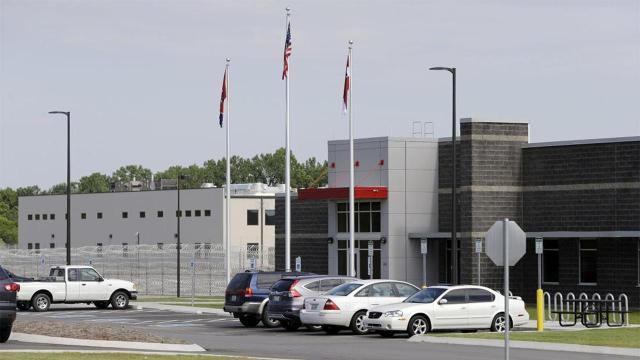Feds to review use of for-profit migrant-detention centers

Private federal prisons are on the way out, and privately run immigration-detention centers could be next.
Jeh Johnson, U.S. Homeland Security secretary, has ordered a Department of Homeland Security advisory committee to evaluate whether Immigration and Customs Enforcement should end the use of private for-profit companies to operate detention centers to hold immigrants.
He wants the review done by Nov. 30.
The announcement comes less than two weeks after the Department of Justice announced that it had directed the federal Bureau of Prisons to phase out the use of privately run for-profit prisons. The decision cited an inspector general's report that concluded private prisons are less safe and not as effective as government-run prisons.
Following the Justice Department's announcement, immigration-rights advocates said Homeland Security should do the same with for-profit detention centers.
On Monday, many of those advocates hailed Johnson's announcement.
They contend that the use of for-profit companies to run immigration-detention centers has fueled a trend to hold more people rather than use less expensive alternatives to detention. It also has led to a host of problems at the facilities, including inadequate medical care that they say has contributed to numerous deaths.
"It's a welcome sign that detention centers are, too, being looked at," said Executive Director Carlos Garcia of Puente Arizona, which advocates for the release of immigrants held in detention. "From what we know, the same horrible conditions at federal prisons are happening in detention centers."
The group has been critical of the 1,550-bed Eloy Detention Center, located about 60 miles south of Phoenix, considered the deadliest in the nation.
Since 2003, 14 deaths, including five suicides, have occurred at Eloy Detention Center, according to an Arizona Republic investigation. Nashville-based Corrections Corporation of America (CXW), one of the largest private-prison contractors in the country, runs the center under contract with Immigration and Customs Enforcement.
In an 11-year period from 2004 to June 2015, at least 32 deaths have occurred at CCA-operated facilities nationwide, according to data collected by Prison Watch News.
Cristina Parker, immigration-programs director at Grassroots Leadership in Austin, Texas, said she hopes that Homeland Security's review of private, for-profit immigration-detention centers concludes with the closing of all of the privately operated centers.
"I am glad they are reviewing, but ultimately an honest and correct outcome of that review is to decide to stop using private prisons," she said. "After all, the DOJ decided they did not want to use these companies for private prisons, and they are the exact same companies involved in immigrant detention."
Rep. Raúl Grijalva, D-Ariz., and Sen. Bernie Sanders, D-Vt., last week called on Homeland Security to stop using private, for-profit companies to house immigration detainees. The two lawmakers instead called on the department to use community-based alternatives that they said are more cost effective while ensuring that immigrants show up for hearings.
Immigrants in alternatives to detention appear in court 99%t of the time and comply with removal 84% of the time, they said. Increasing the use of such options could save the federal government more than $1.4 billion a year, they contend.
Jonathan Burns, a spokesman for Corrections Corporation of America, said in a statement that the company welcomes the review. The company has contracted with the federal government to "provide solutions to pressing immigration challenges for more than 30 years."
"This effort builds on the unfettered, daily, onsite access ICE officials have to our facilities and the thousands of government audits we’re subject to each year. We’re proud of the quality and value of the services we provide and look forward to sharing that information with" the advisory committee, the statement said.
Johnson said he wants a Homeland Security advisory committee to review current policy and practices concerning the use of private immigration detention and to evaluate whether "this practice should be eliminated." The review should consider all factors, including fiscal considerations.
Should DHS decide to end the use of privately run immigration-detention centers, the effect could be much greater than on private prisons.
Forty-one privately run immigration-detention centers contract with Immigration and Customs Enforcement to hold immigrants awaiting deportation or the outcome of immigration hearings. Of the four in Arizona, Eloy Detention Center is the third largest in the nation.
The privately run detention centers house 62% of the about 34,000 immigration beds that Immigration and Customs Enforcement maintains. The vast network of detention centers each year hold more than 300,000 immigrants, according to a 2015 report by Grassroots Leadership, a non-profit group that opposes private prisons.
By comparison, the Department of Justice's decision applies to only 13 private prisons operated under contract with the Bureau of Prisons. They hold about 22,000 inmates, who represent about 11% of the total federal prison population.
Follow Daniel González on Twitter: @azdangonzalez